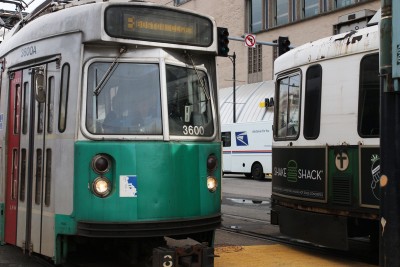
The Massachusetts Department of Transportation and the Massachusetts Bay Transportation Authority hosted the first in a series of public meetings to discuss the Green Line Extension Project Wednesday.
According to a Feb. 23 press release, the meetings are to focus on evaluating the project before a project plan is given to the MassDOT Board of Directors and the MBTA’s Fiscal and Management Control Board in May.
MBTA spokesperson Jason Johnson said the meetings were planned to provide transparency and involve the community.
“We want to encourage public input and suggestions, giving them a forum to express their concerns and hopefully get answers or be directed to where and when they can get answers,” Johnson said.
MBTA general manager Frank DePaola wrote in a Jan. 25 letter that the MBTA aims to conduct a plan as efficiently as possible.
“The GLX Project Team and MassDOT/MBTA as a whole are focused on addressing the issues as quickly and as thoughtfully as possible,” DePaola wrote in the public letter. “We must make sure that we completely understand the current cost-to-complete of the overall project, as well as the implications of any changes to the project design.”
Rafael Mares, vice president and director of healthy communities and environmental justice at the Conservation Law Foundation, discussed the importance of public meetings in a project such as this one.
“The challenge is to address the cost problem and to ensure the Green Line is extended and is what people expected,” Mares said. “It’s important for people to show up and express their support for the extension and at the same time review the designs and see how they can be improved.”
Mares said the long-term benefits of the extension include more reliable transportation options, positive environmental effects and cost effectiveness. In terms of reducing the cost of the project, Mares said solutions must reduce the project cost without significant downsizing or negative impacts on the rider experience.
Jack Wright, interim project manager for the Green Line Extension from the engineering consulting firm Weston and Sampson, gave a presentation in Somerville Wednesday at the first of five public meetings.
The presentation discussed possible solutions currently being researched that will reduce the cost of the project — mostly scaled-back, open-air versions of future Green Line stations, featuring minimal facilities.
According to the presentation, a list of cost-saving ideas will be ultimately be vetted, tested for cost-effectiveness, analyzed for fatal flaws and given feedback. This will result in a new design and cost estimate to be presented to the MBTA Board in May.
Wright said the process for bringing down the costs requires reassessing previous designs to decide what needs to be changed. At the end of the night, Wright forewarned of the schematics provided in the presentation that “nothing shown tonight is a commitment, only ideas used to make estimates.”
Following Wright’s presentation, elected and appointed officials of Medford, Cambridge and Somerville spoke about the project. Many expressed concerns about ensuring the continuation of the project in order to improve the city’s health and crowded roads.
Medford Mayor Stephanie Burke expressed excitement for the possibility of the extension.
“We stand together and work hard on this project,” Burke said. “We must fulfill this project. We’re willing to take some scaled down facilities to achieve that.”
However, many of the residents in attendance were distressed about the lack of funds for the new proposal. Wright emphasized that policymakers would make the final decision, not him, as the crowd began to shout phrases such as, “Where is the governor? Where are [officials] if they work for us?”
More than 100 attendees, as well as several Boston residents, were passionate about reaching a solution and called for the presence of Massachusetts Gov. Charlie Baker at future meetings. Many expressed concerns about the cutbacks on station facilities in order to make up for budget deficits.
Michael Connolly, 61, of Cambridge, said he was upset that funding was scarce.
“Somerville deserves the extension and the community path,” he said. “It’s unacceptable that our transit system cannot get more funding. We need to keep an eye on state legislature and ask for more investment into this project, because the money is there.”
Maria Lamar, 47, of Somerville, called for action from Baker himself.
“Gov. Baker wants Boston to be a world-class city, but that isn’t possible if he can’t find money for this project,” she said. “This meeting needed direct access to decision-makers. We needed more information on how we can actually give meaningful feedback to the people making decisions.”
Jennifer Morris, 58, of the West End, said she anticipates the extension and believes it will greatly improve transportation around the Greater Boston Area.
“I’m out in Somerville quite often … and it’s hard to count on the current available transportation to get me where I need,” she said. “The extension … will seriously improve transportation from Boston out to the greater area and [will] also have a positive environmental impact.”
Alan Wu, 25, of Beacon Hill, said he hopes the MBTA takes the meetings seriously and considers what residents want.
“I’m glad the MBTA is taking initiative with the meetings and giving citizens a chance to have their voices heard,” he said. “Hopefully they address what they plan on doing and they find a way that doesn’t completely rule out the project altogether, because this would be a historical project.”






















































































































